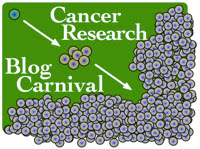Wednesday, July 08, 2009
Rapamycin update
Since some of us in the bay are interested in the translational inhibition activity of rapamycin I thought I would point out an excellent piece at not exactly rocket science reflecting on some new data on rapamycin's effects on aging in mice. Very interesting. The original article at Nature. There are also some great links in the article.
Posted by
Rob
at
3:53 PM
6
comments
![]()
Subscribe to:
Post Comments (Atom)

 Podcast
Podcast




6 comments:
Impressive : "Compared with the non-drug-taking group, the lifespans of the mice given rapamycin increased by up to 14%, even though they were middle-aged when treatment began. Their life expectancy at 20 months shot up by 28% for the males and 38% for the females.1"
To answer the question you asked over on the original blog (Sir2/caloric restriction connection), there is a caloric restriction connection and I know McB was interested in mTOR at one point, but I'm not sure if it bore any fruit, but there is (was?) a potential SirT1 link as well.
@AC - the numbers are pretty impressive, as are the numbers for straight up caloric restriction (CR) in mice. Unfortunately, as you move into other models (eg. primates) the returns diminish substantially. I recall a going to a meeting where primate data was presented and lifelong CR resulted in only a 1 or 2 month lifespan extension.
Of course there's the potential for optimization and the issue of 'healthspan' vs. lifespan.
I ganked this very interesting quote from the post at not exactly rocket science
The drug also increased the average lifespan of males by 9% and of females by 14% (defined as the point at which 90% of the mice were dead). Harrison puts these results into stark context: "By comparison, preventing ALL atherosclerosis and cancer deaths in humans would increase lifespan by less than 9%!"
That's David Harrison of Jackson Labs. Assuming that's accurate it is a pretty interesting stat.
caloric restriction works pretty well in macaques :
"In the latest study, Weindruch and colleagues studied the effects of calorie restriction over two decades in a group of rhesus macaque monkeys.
Half of the monkeys were allowed to eat as they pleased, and the other half ate a carefully controlled diet that provided just two-thirds of the calories they would normally choose to eat.
The team found that half of the monkeys that were allowed to eat freely over the course of the 20-year study have survived, while 80 percent of the monkeys that ate 30 percent fewer calories over the same period are still alive.
While rhesus macaques have an average life span of about 27 years in captivity, the team said.
The animals that ate less had half the amount of heart disease and cancer, and there were no cases of diabetes in the low-calorie group."
That is pretty impressive in macaques. I don't remember what species the data I saw was for, and I don't think I still have the abstract book.
I think it will be more interesting once the end result is in, since it's at year 20 of a 27 year lifespan. I don't think it's any secret that we can extend our healthy years or forestall various life-shortening health problems (like heart disease) through a variety of behaviours. (For example, if the same study was done with half the animals forced to exercise and half remaining sedentary, I wouldn't be surprised at all to see similar results). Meanwhile I think a lot lifespan extension research is talking more about endpoint - changing that 27year lifespan to a 30. Of course taking a CR-mimetic to extend your healthy years would be pretty sweet.
I also find it kind of strange that half their free-eating animals were dead by 20 when the average lifespan is 27. Unless 'eating as they please' is different from how captive macaques are normally treated, why aren't the non-CR animals reaching their expected captive lifespan? By the numbers, the remaining 50% should have an average lifespan of 34 years.
Yeah actually they are cherry picking their data because overall there is no significant difference between the monkeys that were overfed and the ones that were calorie-restricted.
Post a Comment